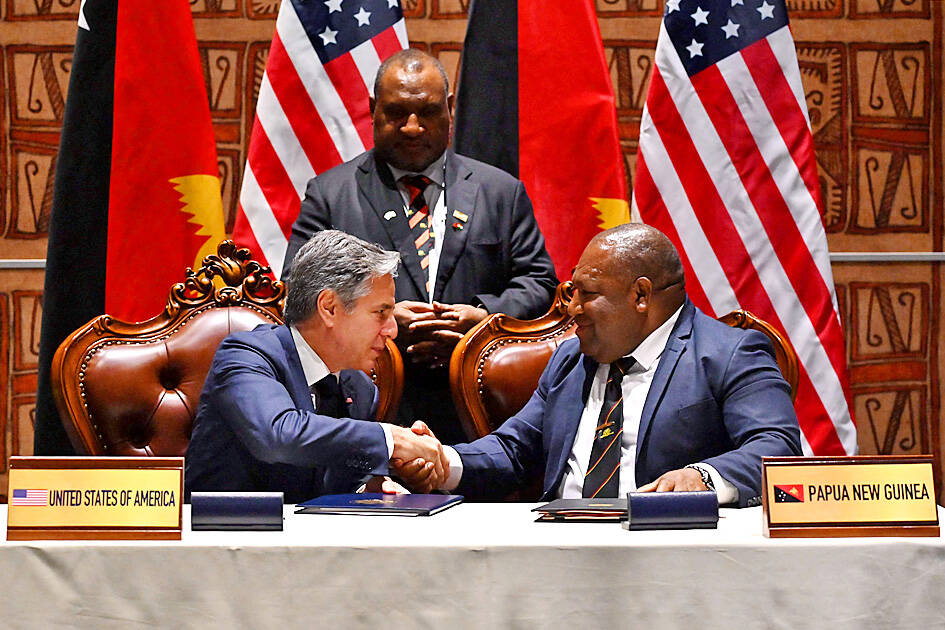The US military can develop and operate out of bases in Papua New Guinea, according to a landmark security pact that is part of Washington’s efforts to outflank China in the Pacific.
The full text of the deal was tabled in Papua New Guinea’s parliament on Wednesday evening and obtained by Agence France-Presse, shedding light on details that have been closely guarded since the pact was signed last month.
With Papua New Guinea’s agreement, the US would be able to station troops and vessels at six key ports and airports, including Lombrum Naval Base on Manus Island and facilities in the capital, Port Moresby.

Photo: AFP
Washington would have “unimpeded access” to the sites to “pre-position equipment, supplies and materiel,” and have “exclusive use” of some base zones, where development and “construction activities” could be carried out.
The agreement opens the door to Washington establishing a new military footprint in the western Pacific, at a time of growing rivalry with Beijing.
Access to Lombrum could be used to reinforce US facilities on Guam to the north, which could be key in the event of a conflict over Taiwan.
Papua New Guinean Prime Minister James Marape has been forced to defend the deal against a wave of protests and criticism, with some opponents questioning whether Papua New Guinea was signing away its sovereignty.
“We have allowed our military to be eroded in the last 48 years,” he told parliament on Wednesday evening. “Sovereignty is defined by the robustness and strength of your military.”
Washington is trying to woo Pacific nations with an array of diplomatic and financial incentives in return for strategic support, after similar moves by Beijing.
The Pacific island nation of Palau has asked the US to step up patrols of its waters after several incursions by Chinese vessels into its exclusive economic zone, Palauan President Surangel Whipps Jr told Reuters in an interview in Tokyo on Wednesday.
Whipps said he would also welcome a bigger US military presence in the country, with troops stationed alongside existing coast guard and civil action teams.
Additional reporting by Reuters

AGING: As of last month, people aged 65 or older accounted for 20.06 percent of the total population and the number of couples who got married fell by 18,685 from 2024 Taiwan has surpassed South Korea as the country least willing to have children, with an annual crude birthrate of 4.62 per 1,000 people, Ministry of the Interior data showed yesterday. The nation was previously ranked the second-lowest country in terms of total fertility rate, or the average number of children a woman has in her lifetime. However, South Korea’s fertility rate began to recover from 2023, with total fertility rate rising from 0.72 and estimated to reach 0.82 to 0.85 by last year, and the crude birthrate projected at 6.7 per 1,000 people. Japan’s crude birthrate was projected to fall below six,

Conflict with Taiwan could leave China with “massive economic disruption, catastrophic military losses, significant social unrest, and devastating sanctions,” a US think tank said in a report released on Monday. The German Marshall Fund released a report titled If China Attacks Taiwan: The Consequences for China of “Minor Conflict” and “Major War” Scenarios. The report details the “massive” economic, military, social and international costs to China in the event of a minor conflict or major war with Taiwan, estimating that the Chinese People’s Liberation Army (PLA) could sustain losses of more than half of its active-duty ground forces, including 100,000 troops. Understanding Chinese

US President Donald Trump in an interview with the New York Times published on Thursday said that “it’s up to” Chinese President Xi Jinping (習近平) what China does on Taiwan, but that he would be “very unhappy” with a change in the “status quo.” “He [Xi] considers it to be a part of China, and that’s up to him what he’s going to be doing, but I’ve expressed to him that I would be very unhappy if he did that, and I don’t think he’ll do that. I hope he doesn’t do that,” Trump said. Trump made the comments in the context

SELF-DEFENSE: Tokyo has accelerated its spending goal and its defense minister said the nation needs to discuss whether it should develop nuclear-powered submarines China is ramping up objections to what it sees as Japan’s desire to acquire nuclear weapons, despite Tokyo’s longstanding renunciation of such arms, deepening another fissure in the two neighbors’ increasingly tense ties. In what appears to be a concerted effort, China’s foreign and defense ministries issued statements on Thursday condemning alleged remilitarism efforts by Tokyo. The remarks came as two of the country’s top think tanks jointly issued a 29-page report framing actions by “right-wing forces” in Japan as posing a “serious threat” to world peace. While that report did not define “right-wing forces,” the Chinese Ministry of Foreign Affairs was